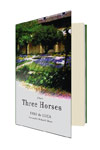One ought to feel good about reading Erri de Luca. Born in 1950, the Neapolitan was meant to be a diplomat but was diverted by the exigencies of leftist politics. He worked at the Fiat factory, laid stones, and rode relief convoy in Yugoslavia. He didn’t publish until age thirty-nine. Over the course of twenty-odd books (including a No. 1 bestseller in Italy), he has become a sort of major minor figure in European letters; enough so to judge Cannes.
His sentences are short, the words small, and the attempts at transport palpable. Often his prose exhibits an archaic formality—which can be jarringly unrealistic when caught between quote marks—not unlike the aphoristic poetry of the Old Testament. (De Luca taught himself Yiddish in order to translate the Bible.) He favors quiet old men who carry the weight of the past on their backs, in one case literally. Prix Femina Étranger winner God’s Mountain (2001) features a Cronenbergish leitmotif in which a cobbler’s “wings” gradually, audibly, break through his hump. It shares a theme with his other translated novels, Sea of Memory (1998) and, now, Three Horses (1999): In a political world, men are impelled to violence for the sake of women; in love or something like it, the men do so with the prior knowledge that the future is a dead dream, or that they are in fact destroying it.
This has some shock value. Scenes of serenity, of a world-wary maturity induced by physical labor precede it, up until the last few pages. “Without beauty the tree can’t manage,” thinks the fifty-year-old gardener and narrator of Three Horses. “So I stop at one spot in the field and ask, ‘Is this where you want to be?’” He has his routines, a good way of maintaining composure. Mornings he puts his coffee on the stove (“All it takes to fill a room”). He drinks wine and reads (only used) books at the tavern, where, one day, a woman catches his eye and later slips him her number. Besides the proprietor and Selim, an African day laborer to whom the gardener regularly gives flowers and herbs to sell, she is his only human contact. Laila, by her own account, is a former dentist who turned to prostitution after a close call with a bleeding canine. “You’re to the south and I feel like someone who is going back down,” he tells her, meaning his hazily sketched escape, years ago, from the military dictatorship in Argentina that took his lover, and odyssey back. She says absurd things like, “You caress every bone in my body, place your lips on my marrow, set my body at peace” by ways of getting him to kill a possessive john, and he counters with profundities like “You never get rid of death’s grease”—and on, like the glazy-eyed proceedings of a soap opera. His serenity shows up as emotional control over his possibly violent past. His ranging platitudes are small recompense for intractable fears (“A murderer repeats the movement of death afterward, in his nerves”). He could be “just going crazy,” as he says.
De Luca’s characters may be subtly prey to madness, mere play-actors, or victims of his vague fantasist disposition. But one begins to see his anti-naturalism as a veneer, threatened by an irruptive reality it finally cannot contain. It’s a bleak world, where people continually blanket life-as-lived in cloying or obtusely bizarre sentiment, and where emotions come secondhand—through mutual delusion or superstition. In his approach, he likely has few contemporaries. That may be a good thing.
—Darren Reidy





